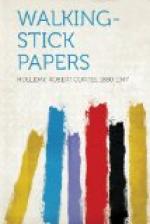This is a point sometimes questioned. It seems to me that it is a good thing for the reviewer to have his work signed, particularly for the young reviewer, whose yet ardent spirit craves a place in the sun. It contributes to his pleasant conception of reviewing as a fine thing to do. It makes him more alive than the anonymous thing. He meets people who brighten at the recollection of having read his name. I know a man who was a very witty reviewer (when he was young); that fellow used to get love letters from ladies he had never seen, just like a baseball pitcher, or a tenor; there was a rich man who ate meals at the Century Club had him there to dinner, because he thought him funny; he got a note from a Literary Adviser asking him for a book manuscript; and two persons wrote him from San Francisco. I myself have had courteous letters thanking me from authors here and in England. That fellow of whom I just spoke undoubtedly was on the threshold of a brilliant career; he was full of courage and laughter, though very poor. Then a great man offered him a Position as a literary editor. His name ceased to be seen; I heard of him after a year, and it was said of him that he was dreadfully bald and had a long beard, I mean of course metaphorically speaking.
Whether signed reviewers are conducive to honesty I am not sure. There was a man (I know him well) wrote a book on Alaska or some such place, claimed he had been there. There was another man, his friend, who was a reviewer. Now the Alaskaian said to the critic: “Why don’t you get my book from the paper? I’ll write the review—I know more about the book than anybody else, anyway; and you sign it and get the money.” And this was done; and it was an excellent review; and the paper (which you read every day) was no wiser.
The literary editor who signed my reviews for me was a youth of an independent turn of mind. He encouraged the expression in reviews of exactly what one thought; he liked an individual note in them; he had an enthusiasm for books of literary quality, somewhat to the neglect of other branches of the publishing business; he gathered about him a group of writers of a spirit kindred to his own; and he was rapidly moulding his department of his paper into a thing, perhaps a plaything, of life and colour.
But he lacked commercial tact. He wanted to make something like the English lighter literary journals. He offended the powers behind the man higher up. I saw him last on a Wednesday; he outlined his plans for the future. On Friday, I know he “made up” his paper. Saturday I looked for him, but he had gone from that place. There was in it a dried man of much hard experience of newspapers, who reigned in that youth’s stead. The wrath of authority grinds with exceeding quickness.
This which I have written is history, as many excellent of mind know, and should be put into a book: for it reveals how close we came to having in this country a Literary Doings that could be read for pleasure. I continued to learn the business.




